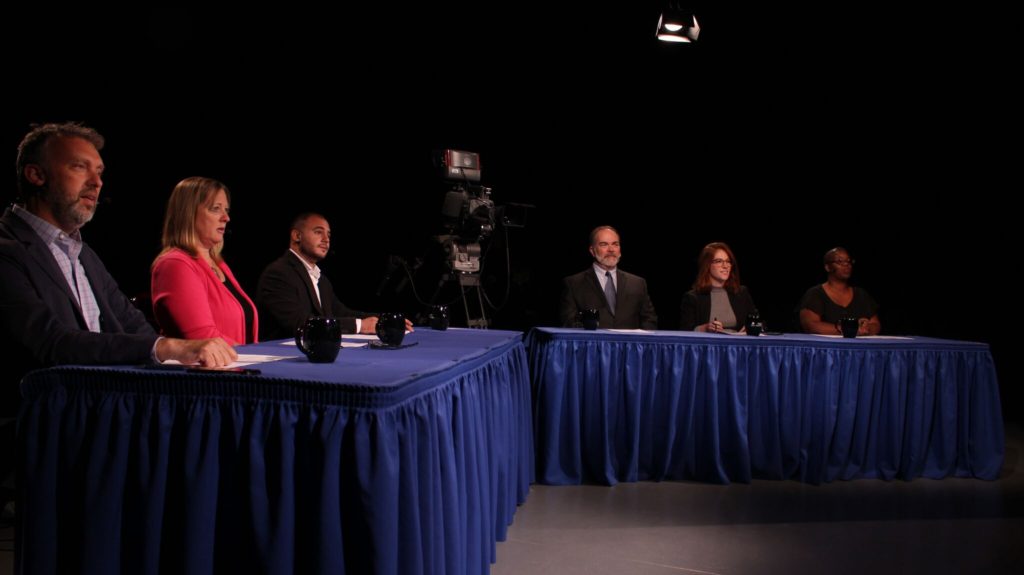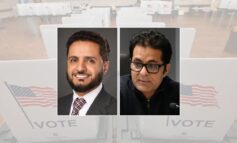As Michiganders seek to turn the state around, the governor’s office – plagued with wide-spread distrust – is being eyed as a worthwhile place to start, beginning with the August 7 primary election.
Shortcomings like an education system that fails to produce enough skilled workers, non-existent public transportation and cities with contaminated water and one of the worst violent crime ratings in the nation continue to set Michigan back, driving away corporations and families who’d otherwise would have invested in the state.
After a turbulent eight years, Rick Snyder will end his tenure as governor and will be succeeded by one of seven candidates.
Michigan Attorney General Bill Schuette, Lieutenant Governor Brian Calley, State Senator Patrick Colbeck (R-Canton) and Saginaw obstetrician Jim Hines are competing in the Republican primary, while former State Senator Gretchen Whitmer, former Detroit Health Department Director Abdul El-Sayed and businessman Shri Thanedar are seeking the Democratic nomination.
On July 10 and 12, a panel of reporters partnered with the Detroit journalism Cooperative interviewed the candidates individually at Detroit Public Television’s studios and asked them about their approaches to several key issues, but this recap will focus on education reform, fixing roads and infrastructure and immigration.
Schuette did not respond to repeated requests and was not interviewed.
Click here for the full videos and transcripts of each candidate’s interview.

Education
As many schools across Michigan turn a century old and succumb to crumbling buildings and a student pay gap that continues to disenfranchise many communities and lead to a skilled workforce shortage, education reform has become a top priority.
The Detroit Public Schools System, the largest school district in the state, recently released a report stating it will cost $500 million to upgrade school facilities to bring them up to current standards.
The Republican candidates generally agreed that Michigan schools are equitably funded, but stressed the need for personalized teaching practices and local control. They also promised to safeguard charter schools.
Colbeck, who served on the Senate Education Policy Committee and as treasurer on the board for the Canton Charter Academy, said schools have the adequate funding and resources they need for students to succeed.
He advocated for choice and rejected assertions that charters act like private schools, while benefiting from public tax dollars.
On the other hand, to address the prohibitive rising costs of colleges and universities, Colbeck was open to state oversight of universities’ financial operations.
But to take care of the high costs of childhood care and preschool, Colbeck said the solution is in restoring a social appreciation for a traditional family structure and the sanctity of marriage.
Calley’s view on the current state of Michigan’s education system and needed reform was slightly more optimistic, based on programs and legislation he’s been involved with as lieutenant governor.
He said a good start to a leveled-playing field across districts was Proposal A, legislation passed in 1994 that secured double the basic education funding for low-funded districts, which he said has closed the gap between disproportionally funded schools by 50 percent.
To upgrade school facilities, Calley said he’d work to provide all school districts with basic funding to improve security, including installing campus-wide monitoring and communication systems.
Calley also underscored the need to unify fragmented programs and entities that evaluate and provide student services based on progress in order to uplift the schools’ outcomes, similar to what’s been done in Flint.
He highlighted the role of skills and trade-based education, community colleges, dual enrollment and apprenticeship opportunities that could give students a head start, while decreasing tuition costs.
Hines suggested strengthening students’ reading, writing and math skills and implementing character-building into the curriculum. He didn’t shy away from supporting shutting down schools that don’t perform well, but said municipalities should make the decision, with the state taking a supervisory role.
He added that charters also play a vital role in fostering a competitive arena, forcing public schools to improve their standards.
To cut down on the high cost burdens of higher education, Hines said colleges and universities should eliminate majors in which the state’s workforce doesn’t have a large demand. He used math and chemistry as an example, but when pressed on the issue, Hines said he wouldn’t know what universities should cut from their course catalog.
The Democratic candidates were unified in their stance against for-profit charters and articulated plans for early childhood education and making some higher education tuition-free for middle class and poor families. They also advocated taxing the rich, to level the playing field across the state.
Whitmer said she wants to triple the number of literacy coaches, have universal early childhood education, make class sizes smaller, add more nurses and social workers and increase teachers’ wages.
She added that as a legislator, she frequently introduced proposals to open up the purposes for which the state’s sinking funds can be used and advocated giving districts the flexibility to raise revenue, but said Democrats’ minority status in Lansing has made it difficult to turn them into law.
She also said she’d set up a scholarship that would utilize $100 million annually from the state’s $710 million Rainy Day Fund (as of Sept. 2017) to create a path toward a free two-year degree.
Whitmer said too many charters, which were pushed for their ability to innovate, are “siphoning taxpayer dollars out of our public schools”, have little accountability and are generally on par with success rates of public schools. She noted that 84 percent of charters have a for-profit motivation.
Thanedar said he would work to increase K-12 and early childhood education funding by restructuring the current funding model so that it’s proportional to districts’ needs, rather than student count.
Some of that money would come from implementing a graduated income tax and the potential passage of the recreational marijuana bill, he said.
Thanedar also said he’d make higher education more affordable by eliminating the state income tax for the less fortunate, creating tuition-free opportunities, give graduates incentives stay in Michigan and forgive those who enter into the education profession of college debt. He would also ask for a 30-year $30 billion dollar bond to pay for school infrastructure improvements.
El-Sayed, who inspected city schools as director of Detroit’s Heath Department from 2015 to Feb. 2017, echoed Whitmer’s sentiments about for-profit charters that have “nipped” at taxpayer money.
Aside from investing more in public education, he proposed that local school districts authorize charter schools and make mandatory that their boards include both parents and teachers.
He would also create avenues for two-year or four-year tuition-free college education for families making less than $150,000 a year.
El-Sayed is against shutting down poorly performing schools and said he would pay for the crumbling school infrastructures across the state by creating a bank funded by a state-wide millage, which he said would allow the lower income districts to redevelop buildings for other purposes, sell some properties to the city and use the funds to buy better facilities.
“This is a means of using what school districts have but don’t need, to build what they need but don’t have,” he said.
Roads and infrastructure
According to Michigan’s Transportation Funding Task Force, the state needs $4 billion just to maintain the roads. All candidates agreed that Michigan’s roads, bridges and water pipes and are in an urgent need of repair or replacement and that just throwing money at roads wouldn’t fix the underlying issue. Most advocated for the use of higher quality material and standards.
Colbeck said transportation studies have looked at road infrastructure repair as a jobs program and not enough as a public service. He said legislators are using the issue of roads as a “bait and switch” and “having more walking around money for other priorities.”
He added that as a state senator, he spearheaded legislation for advanced construction techniques that would make roads last three or four times longer, but would cost about 15 percent more.
Calley spoke of the progress the state has made as it pays off a $2.3 billion transportation fund debt and with the phasing of the 2015 $1.2 billion infrastructure package. As workers have already begun replacing roads, he said engineers are being challenged to lower construction costs by coming up with innovative techniques that integrate technology and asset management, which would have workers responsible for different roads sync scheduling and equipment use.
When asked about what he’s learned from the Flint water crisis as recovery efforts are underway, Calley stressed that government entities should always give its residents the benefit of the doubt when they sound an alarm that something’s gone awry. He added that email conversations between Flint’s mayor and the water department showed that the right questions were asked, but “bureaucratic” and “compliance” speak got in the way of obtaining the right answers.
“Plain answers should be required when plain questions are asked,” he said.
He also said the best approach to eliminating lead poisoning is to work to eventually remove all lead pipes, as Lansing did over the course of 12 years.
Hines said his understanding of the Flint water crisis comes from patients who traveled from Flint to receive healthcare in Saginaw. He said those involved in the negligence leading up to the crisis should be held accountable, but that the investigation, prosecution and defense of those individuals have taken more $23 million of taxpayer money with “little to show for” and which could’ve been used to replace waterlines.
Whitmer pointed out that as a Senate Democratic leader, she and her colleague on the other side of the aisle spearheaded legislation that outlined a long-term plan to fix the roads, but Gov. Snyder killed it before it could go before the State House for a vote. She committed to putting $2 million into the state budget and to pulling $1 billion in federal funds, just for infrastructure repair.
Regarding Flint, she said the fact that 50 percent of African Americans were under emergency management in 2014 had “racial implications.”
She promised to create a Department of the Great Lakes and Fresh Water that would be tasked with ensuring access to clean water and safeguarding the Great Lakes from corporate threats, and to have a clean drinking water ombudsman at the cabinet level.
El-Sayed said his plan to create a Pure Michigan Infrastructure Bank would deal with Michigan’s infrastructure – from roads, to water pipes, to energy and schools – as a bundle and away from political cycles, rather than continuing to “putting a band aid on a bullet hole.”
He said that bank would allow the state to take funding from private sources to fund private projects. He would also ask trucking corporations to pay fees and use the $125 million created from taxes on recreational marijuana.
As a doctor and a member of the Childhood Lead Elimination Task Force during his time as director of the Detroit Health Department, El-Sayed said he’s the right person to cut through bureaucracy to pull federal aid to provide all the services Flint residents need to move forward.
Immigration
With Michigan facing the possibility of losing a congressional seat due to population decline, Gov. Snyder established the Michigan Office for New Americans in 2014 to help retain and attract global talent.
Colbeck said economic policies, like eliminating state income and senior pension tax would convince more families to stay in or move to Michigan, but was cautious about over saturating the work force with migrant workers and was heavily opposed to refugee resettlement.
In late April, Colbeck outraged both Democrats and Republicans when a video surfaced of him giving slideshow presentation to members of United West, a Florida-based organization recognized by the Southern Poverty Law Center as a hate group. In the video, Colbeck recounted a conspiracy theory that Muslims are aiming to implement Shari’a Law in the country – calling it “civilized jihad.” He also falsely charged that El-Sayed was connected to the Muslim Brotherhood.
Colbeck said he supported Snyder’s pause of Syrian refugee resettlement in the state, because he found out that “there was no attention to security” during the refugee screening process.
He added that immigration is not about “setting up unique cultures” and that he’d want to screen refugees to make sure they’re actually interested in “assimilating into American culture.”
Calley acknowledged that attracting global talent and diversity is vital to a prosperous Michigan, but said more people are already returning to Michigan and that its population decline has been leveling off.
He said the current immigration process often sets up other countries for failure, as the U.S. takes away talent like physicians and civil engineers, diminishing their ability to revive stricken communities.
In a few instances, Calley stressed the need to be ensure the immigration and refugee vetting process is reliably safe, but didn’t clarify if he thought proper measures were currently in place.
Deviating from his party’s sentiments, Hines said he is a “strong proponent for immigration and refugees” and that the vetting process was extensive enough.
Whitmer went a step beyond stating that immigration is fundamental, promising to sue the federal government for separating migrant children from their families, to pull National Guard troops from the U.S.-Mexico border and to use her bully pulpit as governor to stand up for immigrant families.
Thanedar said he “came to this country with $20 in his pocket and a big dream” and is running to help others achieve the same dreams. He would start by making technical career education available for new immigrants through community colleges and other programs.
El-Sayed promised not to spend a dime enforcing federal immigration policy and to push legislation so that state law enforcement agencies don’t comply with ICE officials.
He would also push for undocumented immigrants’ rights to obtain a driver’s license and the state resources that come along with it.
About this series
New Michigan Media (NMM) is the collaboration of the five leading minority media outlets in the region. The New Michigan Media Newspapers have a combined estimated reach of more than 140,000 weekly, and include The Latino Press, the Michigan Chronicle, the Jewish News, the Michigan Korean Weekly and The Arab American News. For the past three years, NMM has also been a member of the Detroit Journalism Cooperative (DJC), the unique collaboration between some of the leading media outlets of the region, which includes The Center for Michigan’s Bridge Magazine, Detroit Public Television, Michigan Public Radio and WDET. Funded by the John S. and James L. Knight Foundation, the DJC aims to report about and create community engagement opportunities in Detroit and the region. The article you are reading is part of the DJC project of this year and will appear in all the NMM member newspapers, as well as with the DJC partners.







Leave a Reply